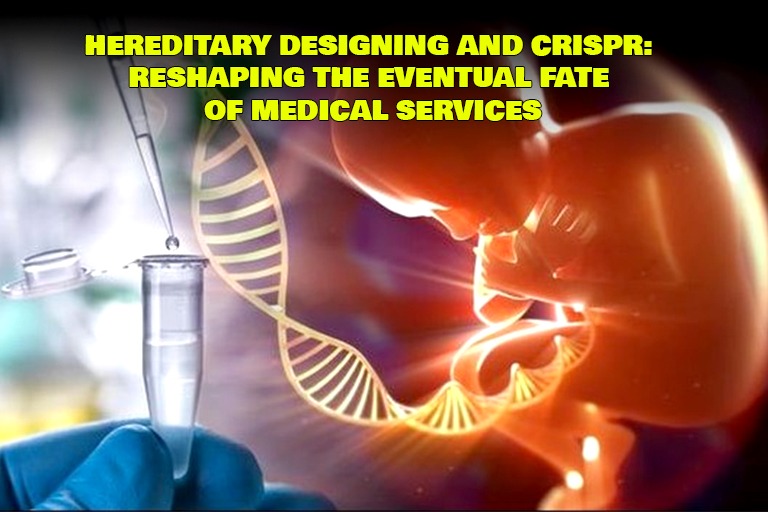Headways in hereditary designing and the advancement of the progressive CRISPR innovation have opened up extraordinary opportunities for reshaping the fate of medical care. These pivotal devices can change the treatment of hereditary sicknesses, improve the comprehension of intricate organic cycles, and even make ready for customized medication. In this article, we investigate the capability of hereditary designing and CRISPR to alter medical services and the moral contemplations encompassing their utilization.
- Understanding Hereditary Designing:
Hereditary designing includes the control of a living being’s DNA to present or alter explicit qualities. Customary hereditary designing strategies have been utilized for a very long time to change crops, make hereditarily changed organic entities (GMOs), and produce recombinant proteins. Be that as it may, the new rise of CRISPR has reformed the field by offering a profoundly productive, exact, and savvy instrument for quality altering.
- CRISPR: The Unique Advantage in Quality Altering:
CRISPR (Bunched Consistently Interspaced Short Palindromic Rlthehashes) is a strong quality-altering instrument got from a bacterial guard system against infections. It comprises two principal parts: an aide RNA that objectives the particular DNA grouping to be altered and a compound called Cas9 that goes about as sub-atomic scissors to cut the DNA at the objective site. This innovation permits researchers to erase, embed, or supplant explicit DNA fragments with unmatched precision.
- Ethical Contemplations:
While the capability of hereditary designing and CRISPR is enormous, it is vital to address the moral contemplations related to their utilization. Questions emerge regarding the ramifications of germline altering, which includes adjusting qualities that can be acquired by people in the future. The discussion encompassing the moral limits of modifying human genomes stays a mind-boggling and progressing conversation that requests cautious examination.
- Gene Altering for Neurological Issues:
Notwithstanding the applications referenced before, hereditary designing and CRISPR hold critical commitments for treating neurological problems. Conditions like Huntington’s illness, Alzheimer’s sickness, and Parkinson’s infection have complex hereditary parts. CRISPR innovation permits specialists to target and change the qualities related to these issues, possibly prompting the advancement of medicines or even anticipation systems.
- Precision Medication and Customized Treatments:
One of the most thrilling possibilities of hereditary designing and CRISPR is the improvement of customized medication. By breaking down a person’s hereditary cosmetics, researchers can recognize explicit quality variations that add to sickness powerlessness or therapy reaction. With this data, fitted treatments can be intended to address a patient’s remarkable hereditary profile, streamlining treatment results and limiting unfavorable impacts.
- Enhancing Yield Creation and Food Security:
Hereditary designing methods have been widely utilized in agribusiness to further develop crop creation and address food security challenges. By bringing explicit characteristics into crops, like infection obstruction, expanded yield, and upgraded dietary benefits, researchers can foster stronger and more feasible agrarian practices. This can battle hunger, lessen the utilization of pesticides, and guarantee a steady food supply for a developing worldwide populace.
- Unraveling the Intricacy of Science:
Hereditary designing and CRISPR empower specialists to study and grasp the unpredictable instruments of basic natural cycles. By controlling qualities and noticing the subsequent impacts, researchers can disentangle the intricacies of illnesses, formative pathways, and cell capabilities. This information adds to how we might interpret essential science and opens up roads for creating novel treatments and intercessions.
- Safety and Guideline:
As the field of hereditary designing advances, guaranteeing the well-being and mindful utilization of these innovations becomes foremost. Thorough guidelines and moral rules should be laid out to administer the turn of events and use of hereditary designing procedures. Extensive gamble appraisals, straightforwardness in the examination, and public commitment are vital for addressing concerns regarding unseen side-effects, ecological effects, and possible abuse of these useful assets.
- Advancements in Clinical Preliminaries and Medication Improvement:
Hereditary designing and CRISPR innovation are additionally impacting the scene of clinical preliminaries and medication improvement. Conventional medication revelation processes are frequently extensive and costly, with high paces of disappointment. Notwithstanding, hereditary designing takes into account the production of more exact sickness models, known as organoids or “smaller than normal organs,” which intently imitate human physiology. These models empower specialists to test potential medication up-and-comers all the more productively, prompting quicker recognizable proof of powerful medicines and diminishing the dependence on creature testing.
- Addressing Hereditary Legacy and Regenerative Well-being:
Hereditary designing methods offer the possibility to address hereditary legacy and work on conceptive wellbeing. Preimplantation Hereditary Finding (PGD) permits undeveloped organisms made through in vitro preparation (IVF) to be evaluated for hereditary irregularities before implantation, lessening the gamble of giving acquired sicknesses to people in the future. Also, quality altering in human undeveloped organisms (germline altering) can address illness-causing transformations right off the bat being developed. Be that as it may, the moral ramifications and likely long-haul outcomes of germline altering require careful assessment and cultural agreement.
- Bioengineering and Tissue Recovery:
Hereditary designing, combined with headways in bioengineering, is impelling the field of tissue recovery. Researchers can design cells to create explicit development elements, proteins, or frameworks that guide tissue fix and recovery. This approach holds a guarantee for treating conditions like spinal rope wounds, coronary illness, and organ harm. By controlling qualities, specialists plan to improve the regenerative limit of cells and tissues, advancing mending and reestablishing typical capability.
- Bioethics and Public Commitment:
The moral ramifications encompassing hereditary designing and CRISPR innovation require progressing conversations including researchers, policymakers, ethicists, and general society. Offsetting the possible advantages with worries connected with protection, value, unseen side-effects, and the changing of the human germline requires cautious thought. Public commitment is pivotal to guarantee that choices about the applications and restrictions of hereditary designing reflect assorted viewpoints and cultural qualities.
Conclusion:
Hereditary designing and CRISPR can change medical services by upsetting the therapy of hereditary sicknesses, further developing medication improvement, tending to worldwide food security, and propelling comprehension we might interpret science. Notwithstanding, as we adventure further into these boondocks, we should explore moral contemplations, security concerns, and impartial admittance to guarantee that these innovations are tackled capably and to help all. By embracing dependable examination, strong guidelines, and open exchange, we can shape a future where hereditary designing and CRISPR assume vital parts in reshaping the scene of medical services and further developing the prosperity of people around the world.
Read more.. Environmental Change and its Worldwide Results: Atrocities Required
Read more.. Mechanical Technology in Medical Services: Upgrading Patient Consideration and Operations




